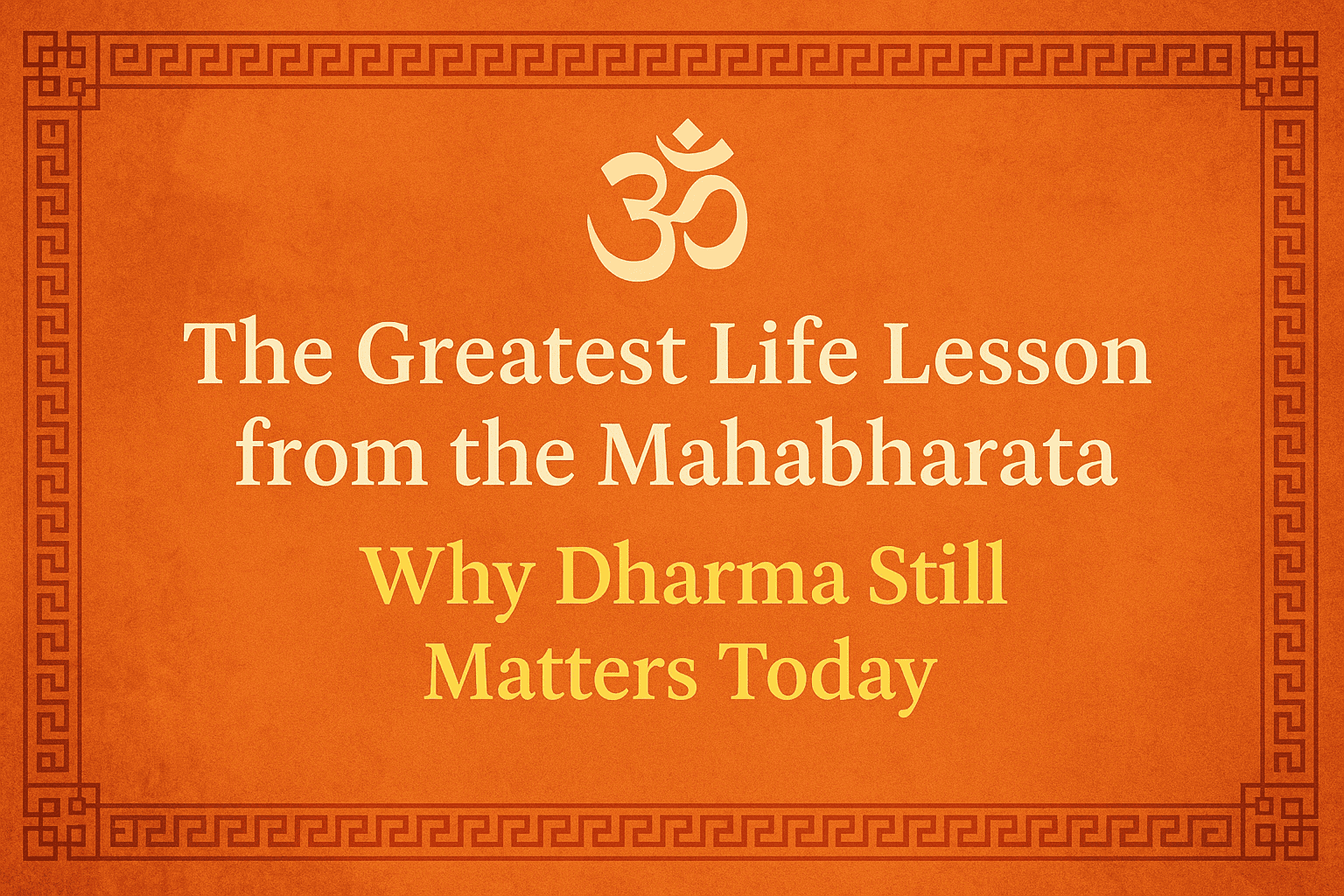ASTROLOGY
The Greatest Life Lesson from the Mahabharata: Why Dharma Still Matters Today

Introduction: A War Beyond Swords
The Mahabharata is one of the most revered epics in human history. Written thousands of years ago by the sage Vyasa, it continues to resonate with readers across time, geography, and generations. While it is known for its intense battles, dramatic twists, and divine interventions, at its core, the Mahabharata is a philosophical and moral guide.
Among its many lessons—on love, loyalty, justice, power, and ego—one lesson stands taller than the rest:
“Always follow Dharma (righteousness), even if the path is painful.”
This central idea is not just a religious or spiritual teaching, but a timeless compass for anyone facing life’s moral dilemmas.
What Is Dharma?
In simple terms, Dharma means doing what is right—ethically, morally, and truthfully. But in the Mahabharata, Dharma is not a fixed rulebook; it's a deeply personal and contextual duty.
- For a king, it means protecting his people.
- For a warrior, it means fighting for justice.
- For a husband, it means being loyal and truthful.
- For a friend, it means standing by righteousness—even when your loved ones are wrong.
Dharma is about doing the right thing, at the right time, in the right way, even when it’s the hardest choice.
The Kurukshetra Dilemma: Arjuna’s Inner War
The most iconic scene in the Mahabharata takes place not in the heat of battle, but in the moment before it begins. Arjuna, the great warrior of the Pandavas, stands on the battlefield of Kurukshetra, looking at his enemies—who also happen to be his family, teachers, and friends.
He is torn. His heart aches. He drops his bow.
“How can I kill those I love?” he asks Krishna.
This moment is powerful because it reflects a struggle we all go through—when emotions conflict with responsibilities.
Krishna doesn’t tell him to shut off his feelings. Instead, he explains the Bhagavad Gita, a divine guide on life, action, and detachment. He teaches Arjuna that:
“You have a duty to fight for righteousness. It is not your place to decide outcomes—only to act with integrity.”
And with that, Arjuna picks up his bow again—not for revenge, but for Dharma.
Do Check it Also
Why Following Dharma Is So Difficult
Choosing Dharma is rarely easy. Often, it's the path filled with pain, loss, or isolation.
- Bhishma, the grandsire of the Kuru dynasty, remained loyal to the throne, even when it sided with injustice. He failed to stand up for Draupadi when she was humiliated, despite knowing it was wrong. His silence haunted him.
- Karna, born with divine power and a golden heart, aligned with Duryodhana out of gratitude and friendship. But his loyalty led him to fight for adharma, and in the end, he perished with regret.
- Yudhishthira, known as Dharmaraj, made mistakes too. But he consistently tried to uphold truth and fairness, and that made him worthy of peace and redemption.
These examples show us that Dharma is not about perfection, but about intention and courage. It's not always rewarded immediately, but in the long run, it leads to inner peace and lasting honor.
How This Applies to Our Lives
You may not be on a battlefield, but every day you fight your own Kurukshetra.
- Standing up against injustice in your family or workplace
- Choosing honesty when lies seem easier
- Letting go of attachments that hinder your growth
- Being true to your values when everyone else seems to compromise
Following Dharma today might mean saying “no” to a wrong trend, speaking out when silence is safer, or letting go of toxic relationships despite emotional bonds.
It’s not always dramatic, but it’s always difficult. And that’s what makes it noble.
Dharma in the Inner World
Beyond external actions, the Mahabharata teaches us that the real battle is within. Arjuna’s hesitation reflects our own inner conflicts. Krishna represents our higher wisdom—that calm voice inside us that knows what is right. The Kauravas? Our inner egos, desires, and fears that try to overpower us.
Listening to your inner Krishna—your conscience—and following it through your actions is the ultimate practice of Dharma.
Final Thoughts: Truth Will Always Triumph
The Mahabharata ends not just with the victory of the Pandavas, but with the victory of Dharma. The cost was high—many lives lost, many hearts broken—but in the end, righteousness prevailed.
So, the next time life places you in a moral dilemma, remember the Mahabharata. Remember Krishna’s words.
“You have control over your actions, not over the results.”
Do your part with truth, courage, and love—and let Dharma guide you.
Call to Action:
Have you faced your own Kurukshetra? A moment when doing the right thing was the hardest thing?
Share your story or reflections in the comments. Let’s learn from each other, and walk the path of Dharma together.
